Self-awareness audit and reflection for occupational therapy nurse
VerifiedAdded on 2023/06/04
|8
|1808
|299
AI Summary
This article discusses the skills and experiences required for an occupational therapy nurse, identifies gaps in skills, and provides an action plan to improve. It also includes a reflection on the author's career values and interests.
Contribute Materials
Your contribution can guide someone’s learning journey. Share your
documents today.
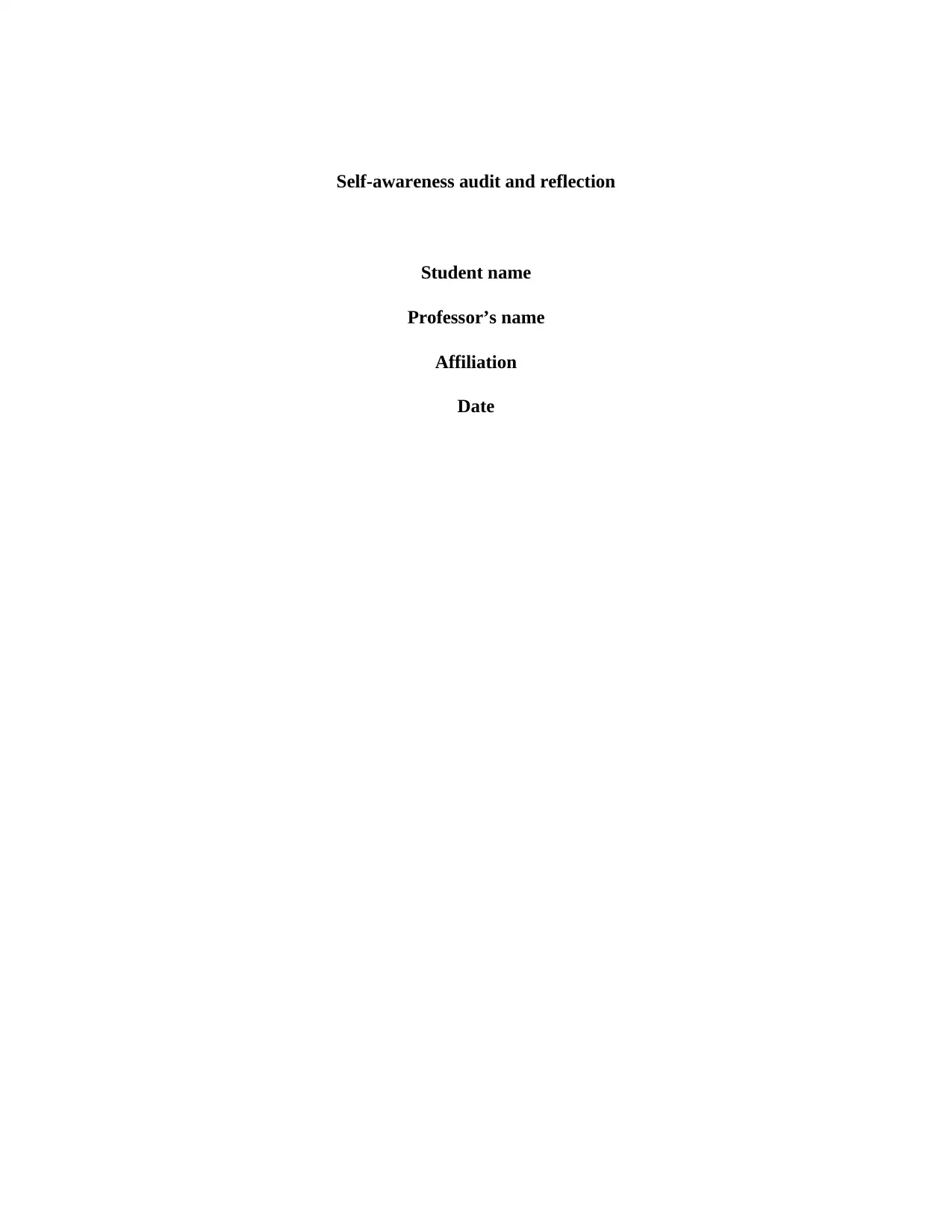
Self-awareness audit and reflection
Student name
Professor’s name
Affiliation
Date
Student name
Professor’s name
Affiliation
Date
Secure Best Marks with AI Grader
Need help grading? Try our AI Grader for instant feedback on your assignments.
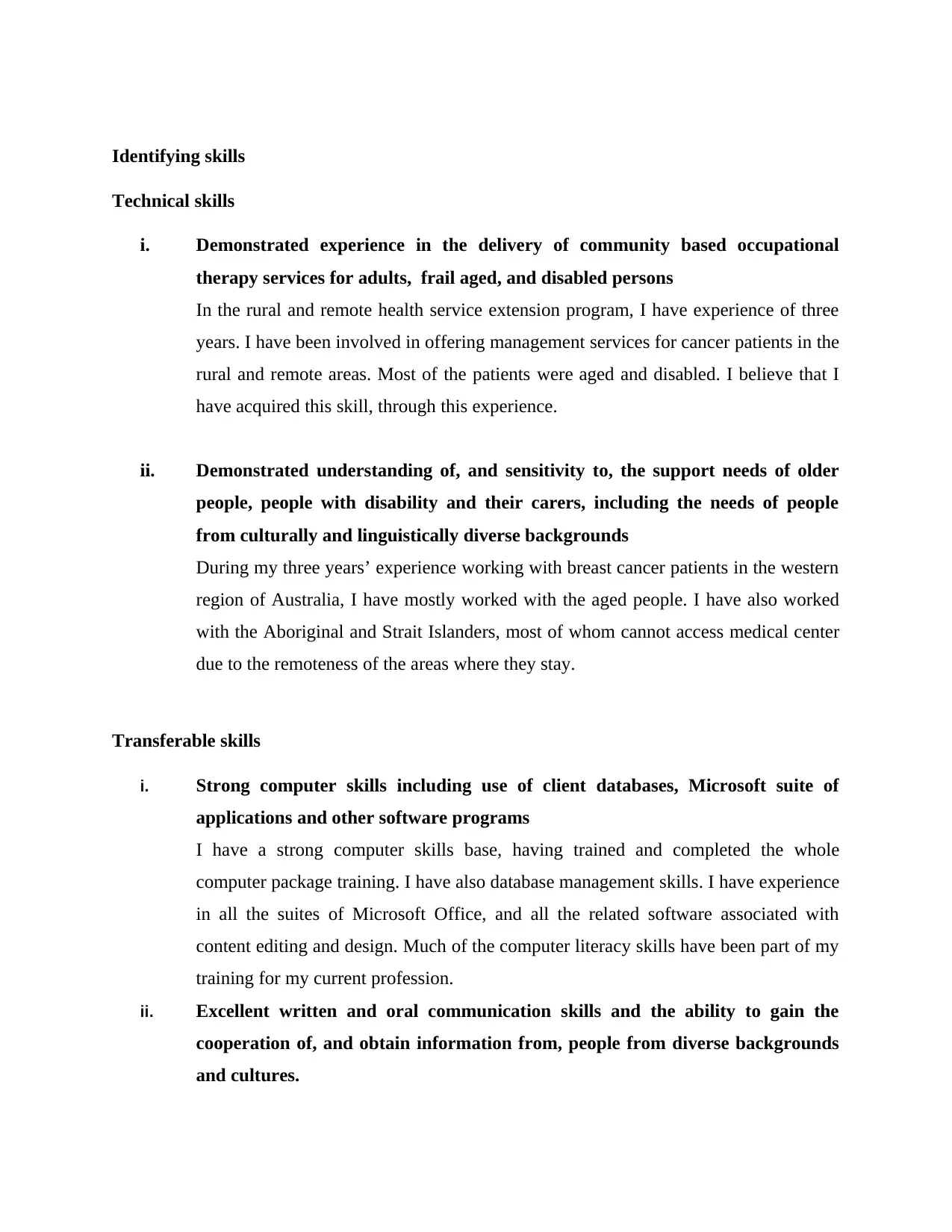
Identifying skills
Technical skills
i. Demonstrated experience in the delivery of community based occupational
therapy services for adults, frail aged, and disabled persons
In the rural and remote health service extension program, I have experience of three
years. I have been involved in offering management services for cancer patients in the
rural and remote areas. Most of the patients were aged and disabled. I believe that I
have acquired this skill, through this experience.
ii. Demonstrated understanding of, and sensitivity to, the support needs of older
people, people with disability and their carers, including the needs of people
from culturally and linguistically diverse backgrounds
During my three years’ experience working with breast cancer patients in the western
region of Australia, I have mostly worked with the aged people. I have also worked
with the Aboriginal and Strait Islanders, most of whom cannot access medical center
due to the remoteness of the areas where they stay.
Transferable skills
i. Strong computer skills including use of client databases, Microsoft suite of
applications and other software programs
I have a strong computer skills base, having trained and completed the whole
computer package training. I have also database management skills. I have experience
in all the suites of Microsoft Office, and all the related software associated with
content editing and design. Much of the computer literacy skills have been part of my
training for my current profession.
ii. Excellent written and oral communication skills and the ability to gain the
cooperation of, and obtain information from, people from diverse backgrounds
and cultures.
Technical skills
i. Demonstrated experience in the delivery of community based occupational
therapy services for adults, frail aged, and disabled persons
In the rural and remote health service extension program, I have experience of three
years. I have been involved in offering management services for cancer patients in the
rural and remote areas. Most of the patients were aged and disabled. I believe that I
have acquired this skill, through this experience.
ii. Demonstrated understanding of, and sensitivity to, the support needs of older
people, people with disability and their carers, including the needs of people
from culturally and linguistically diverse backgrounds
During my three years’ experience working with breast cancer patients in the western
region of Australia, I have mostly worked with the aged people. I have also worked
with the Aboriginal and Strait Islanders, most of whom cannot access medical center
due to the remoteness of the areas where they stay.
Transferable skills
i. Strong computer skills including use of client databases, Microsoft suite of
applications and other software programs
I have a strong computer skills base, having trained and completed the whole
computer package training. I have also database management skills. I have experience
in all the suites of Microsoft Office, and all the related software associated with
content editing and design. Much of the computer literacy skills have been part of my
training for my current profession.
ii. Excellent written and oral communication skills and the ability to gain the
cooperation of, and obtain information from, people from diverse backgrounds
and cultures.
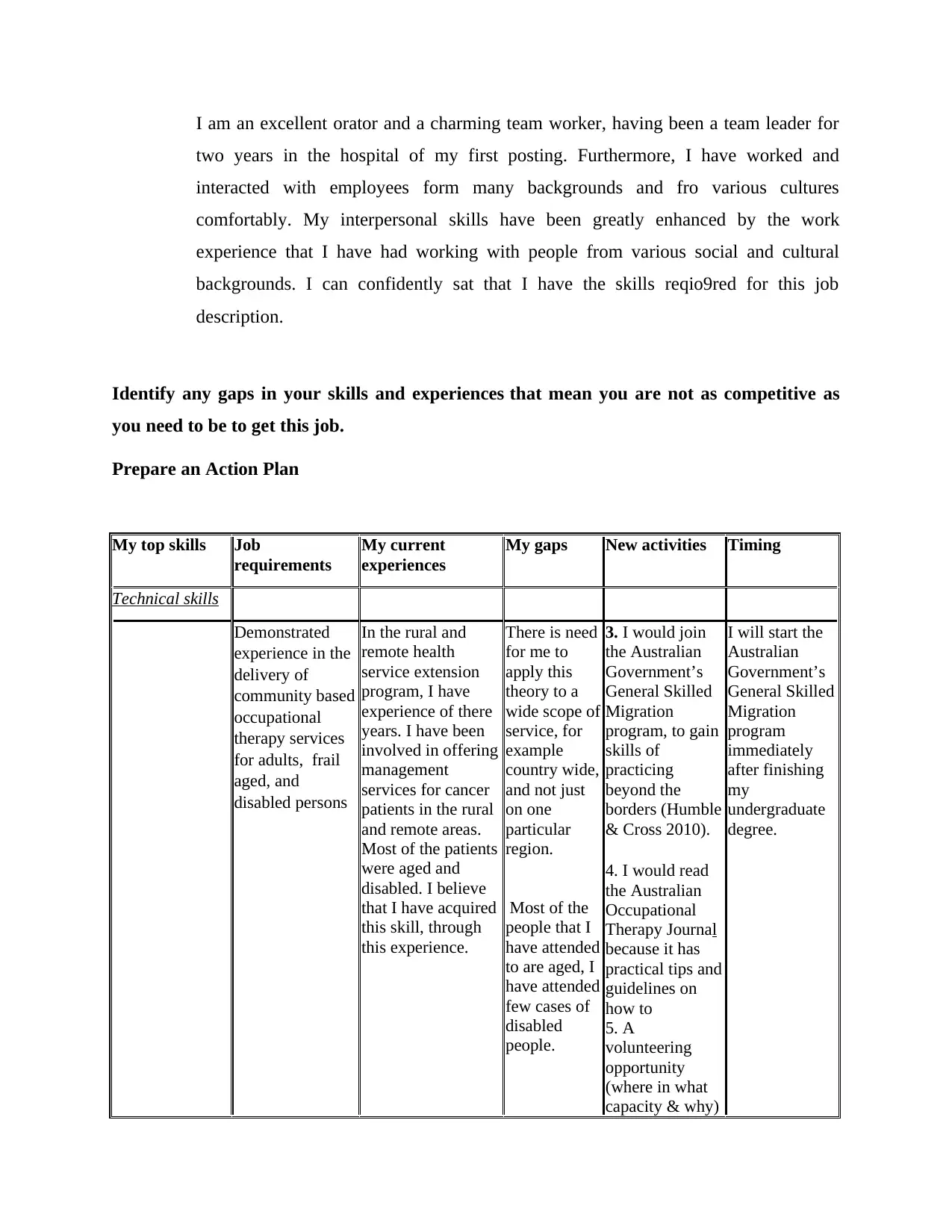
I am an excellent orator and a charming team worker, having been a team leader for
two years in the hospital of my first posting. Furthermore, I have worked and
interacted with employees form many backgrounds and fro various cultures
comfortably. My interpersonal skills have been greatly enhanced by the work
experience that I have had working with people from various social and cultural
backgrounds. I can confidently sat that I have the skills reqio9red for this job
description.
Identify any gaps in your skills and experiences that mean you are not as competitive as
you need to be to get this job.
Prepare an Action Plan
My top skills Job
requirements
My current
experiences
My gaps New activities Timing
Technical skills
Demonstrated
experience in the
delivery of
community based
occupational
therapy services
for adults, frail
aged, and
disabled persons
In the rural and
remote health
service extension
program, I have
experience of there
years. I have been
involved in offering
management
services for cancer
patients in the rural
and remote areas.
Most of the patients
were aged and
disabled. I believe
that I have acquired
this skill, through
this experience.
There is need
for me to
apply this
theory to a
wide scope of
service, for
example
country wide,
and not just
on one
particular
region.
Most of the
people that I
have attended
to are aged, I
have attended
few cases of
disabled
people.
3. I would join
the Australian
Government’s
General Skilled
Migration
program, to gain
skills of
practicing
beyond the
borders (Humble
& Cross 2010).
4. I would read
the Australian
Occupational
Therapy Journal
because it has
practical tips and
guidelines on
how to
5. A
volunteering
opportunity
(where in what
capacity & why)
I will start the
Australian
Government’s
General Skilled
Migration
program
immediately
after finishing
my
undergraduate
degree.
two years in the hospital of my first posting. Furthermore, I have worked and
interacted with employees form many backgrounds and fro various cultures
comfortably. My interpersonal skills have been greatly enhanced by the work
experience that I have had working with people from various social and cultural
backgrounds. I can confidently sat that I have the skills reqio9red for this job
description.
Identify any gaps in your skills and experiences that mean you are not as competitive as
you need to be to get this job.
Prepare an Action Plan
My top skills Job
requirements
My current
experiences
My gaps New activities Timing
Technical skills
Demonstrated
experience in the
delivery of
community based
occupational
therapy services
for adults, frail
aged, and
disabled persons
In the rural and
remote health
service extension
program, I have
experience of there
years. I have been
involved in offering
management
services for cancer
patients in the rural
and remote areas.
Most of the patients
were aged and
disabled. I believe
that I have acquired
this skill, through
this experience.
There is need
for me to
apply this
theory to a
wide scope of
service, for
example
country wide,
and not just
on one
particular
region.
Most of the
people that I
have attended
to are aged, I
have attended
few cases of
disabled
people.
3. I would join
the Australian
Government’s
General Skilled
Migration
program, to gain
skills of
practicing
beyond the
borders (Humble
& Cross 2010).
4. I would read
the Australian
Occupational
Therapy Journal
because it has
practical tips and
guidelines on
how to
5. A
volunteering
opportunity
(where in what
capacity & why)
I will start the
Australian
Government’s
General Skilled
Migration
program
immediately
after finishing
my
undergraduate
degree.

6. I would join
Deakin Nursing
and Midwifery
Society.
Non-technical
skills
Communication
skills.
I am a good
orator, and have
perfected my peer
to peer
communication.
I have a deep
experience in
communicating to
clients and
responding to each
client as a person.
I have limited
exposure in
giving
professional
talks.
1.
CNA803
(Advanced
Clinical Nursing
Practice). I
would take this
course to
advance my
nursing practice
(Hodges, Keeley
& Troyan 2008).
2. I could do
perioperative
care. Some of
the units in this
area of specialty
include:
Foundations of
Perioperative
Nursing Practice
(CNA754)
3. I would join
the International
Council of
Nurses. It is a
global council of
nurses that
develops
international
standards for
practice of
nursing across
the globe
(Brunero,
Lamont &
Coates 2010).
4. I would read
the Journal of
I will complete
the following
units (Boomer,
&
McCormack,
2010).
HNN120
HBS107
HNN112
Deakin Nursing
and Midwifery
Society.
Non-technical
skills
Communication
skills.
I am a good
orator, and have
perfected my peer
to peer
communication.
I have a deep
experience in
communicating to
clients and
responding to each
client as a person.
I have limited
exposure in
giving
professional
talks.
1.
CNA803
(Advanced
Clinical Nursing
Practice). I
would take this
course to
advance my
nursing practice
(Hodges, Keeley
& Troyan 2008).
2. I could do
perioperative
care. Some of
the units in this
area of specialty
include:
Foundations of
Perioperative
Nursing Practice
(CNA754)
3. I would join
the International
Council of
Nurses. It is a
global council of
nurses that
develops
international
standards for
practice of
nursing across
the globe
(Brunero,
Lamont &
Coates 2010).
4. I would read
the Journal of
I will complete
the following
units (Boomer,
&
McCormack,
2010).
HNN120
HBS107
HNN112
Secure Best Marks with AI Grader
Need help grading? Try our AI Grader for instant feedback on your assignments.
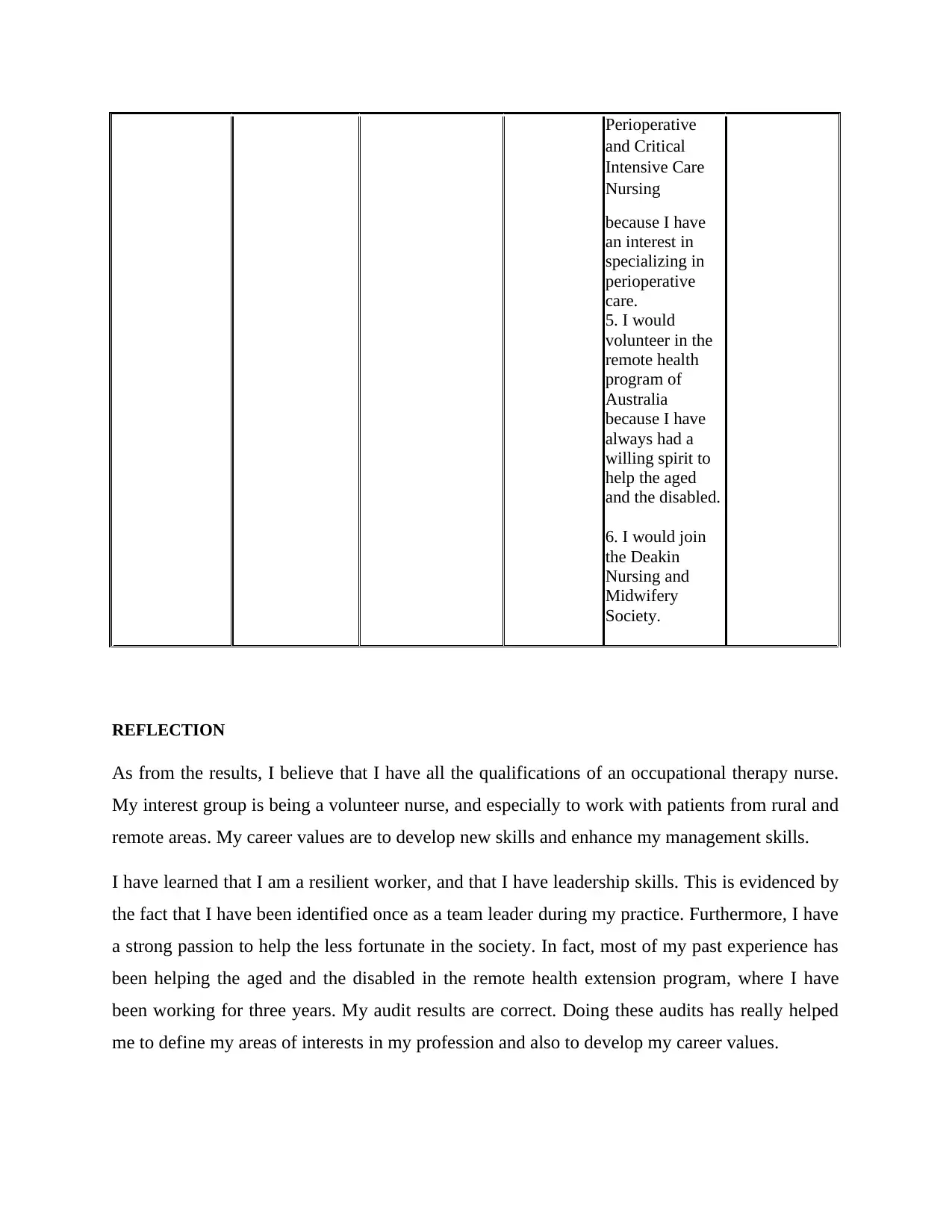
Perioperative
and Critical
Intensive Care
Nursing
because I have
an interest in
specializing in
perioperative
care.
5. I would
volunteer in the
remote health
program of
Australia
because I have
always had a
willing spirit to
help the aged
and the disabled.
6. I would join
the Deakin
Nursing and
Midwifery
Society.
REFLECTION
As from the results, I believe that I have all the qualifications of an occupational therapy nurse.
My interest group is being a volunteer nurse, and especially to work with patients from rural and
remote areas. My career values are to develop new skills and enhance my management skills.
I have learned that I am a resilient worker, and that I have leadership skills. This is evidenced by
the fact that I have been identified once as a team leader during my practice. Furthermore, I have
a strong passion to help the less fortunate in the society. In fact, most of my past experience has
been helping the aged and the disabled in the remote health extension program, where I have
been working for three years. My audit results are correct. Doing these audits has really helped
me to define my areas of interests in my profession and also to develop my career values.
and Critical
Intensive Care
Nursing
because I have
an interest in
specializing in
perioperative
care.
5. I would
volunteer in the
remote health
program of
Australia
because I have
always had a
willing spirit to
help the aged
and the disabled.
6. I would join
the Deakin
Nursing and
Midwifery
Society.
REFLECTION
As from the results, I believe that I have all the qualifications of an occupational therapy nurse.
My interest group is being a volunteer nurse, and especially to work with patients from rural and
remote areas. My career values are to develop new skills and enhance my management skills.
I have learned that I am a resilient worker, and that I have leadership skills. This is evidenced by
the fact that I have been identified once as a team leader during my practice. Furthermore, I have
a strong passion to help the less fortunate in the society. In fact, most of my past experience has
been helping the aged and the disabled in the remote health extension program, where I have
been working for three years. My audit results are correct. Doing these audits has really helped
me to define my areas of interests in my profession and also to develop my career values.
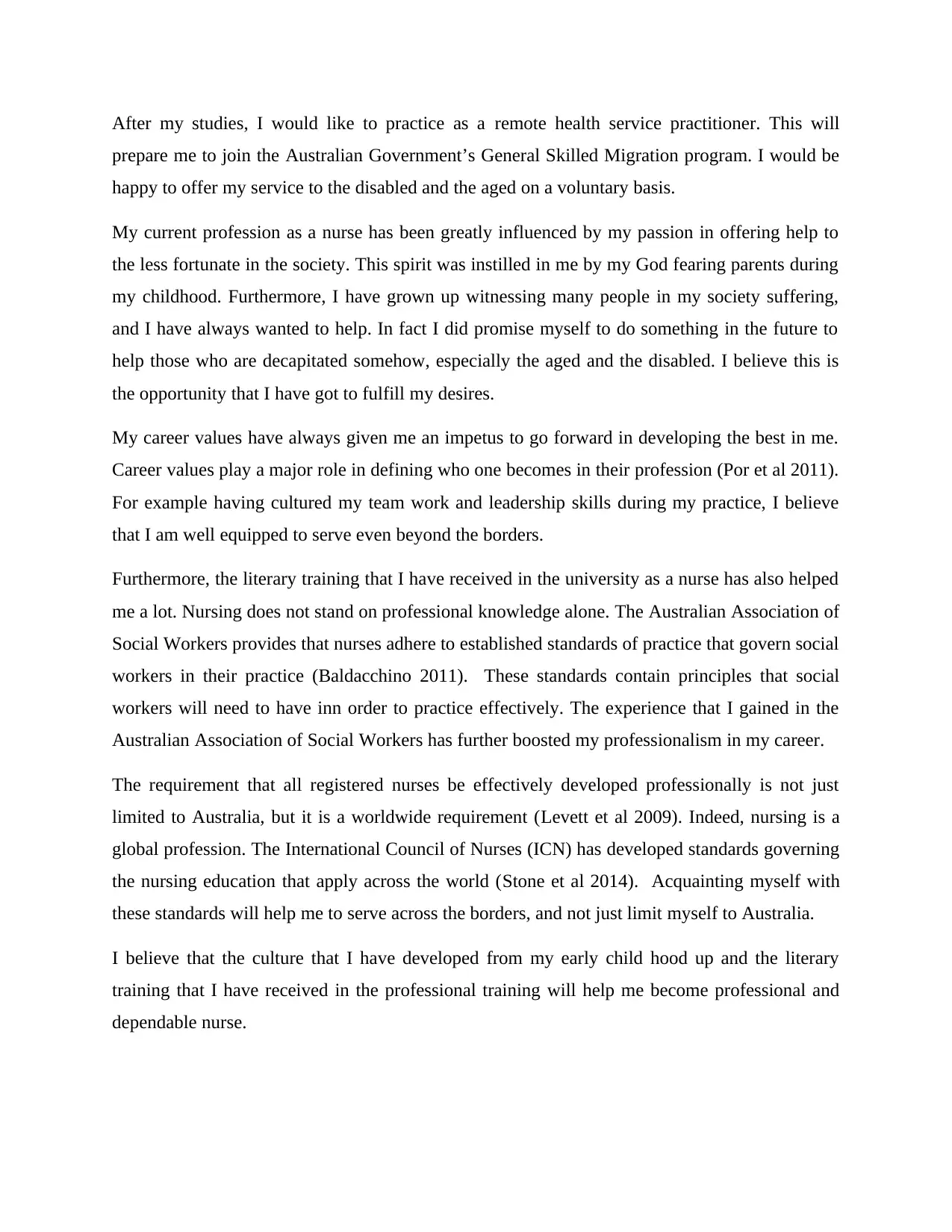
After my studies, I would like to practice as a remote health service practitioner. This will
prepare me to join the Australian Government’s General Skilled Migration program. I would be
happy to offer my service to the disabled and the aged on a voluntary basis.
My current profession as a nurse has been greatly influenced by my passion in offering help to
the less fortunate in the society. This spirit was instilled in me by my God fearing parents during
my childhood. Furthermore, I have grown up witnessing many people in my society suffering,
and I have always wanted to help. In fact I did promise myself to do something in the future to
help those who are decapitated somehow, especially the aged and the disabled. I believe this is
the opportunity that I have got to fulfill my desires.
My career values have always given me an impetus to go forward in developing the best in me.
Career values play a major role in defining who one becomes in their profession (Por et al 2011).
For example having cultured my team work and leadership skills during my practice, I believe
that I am well equipped to serve even beyond the borders.
Furthermore, the literary training that I have received in the university as a nurse has also helped
me a lot. Nursing does not stand on professional knowledge alone. The Australian Association of
Social Workers provides that nurses adhere to established standards of practice that govern social
workers in their practice (Baldacchino 2011). These standards contain principles that social
workers will need to have inn order to practice effectively. The experience that I gained in the
Australian Association of Social Workers has further boosted my professionalism in my career.
The requirement that all registered nurses be effectively developed professionally is not just
limited to Australia, but it is a worldwide requirement (Levett et al 2009). Indeed, nursing is a
global profession. The International Council of Nurses (ICN) has developed standards governing
the nursing education that apply across the world (Stone et al 2014). Acquainting myself with
these standards will help me to serve across the borders, and not just limit myself to Australia.
I believe that the culture that I have developed from my early child hood up and the literary
training that I have received in the professional training will help me become professional and
dependable nurse.
prepare me to join the Australian Government’s General Skilled Migration program. I would be
happy to offer my service to the disabled and the aged on a voluntary basis.
My current profession as a nurse has been greatly influenced by my passion in offering help to
the less fortunate in the society. This spirit was instilled in me by my God fearing parents during
my childhood. Furthermore, I have grown up witnessing many people in my society suffering,
and I have always wanted to help. In fact I did promise myself to do something in the future to
help those who are decapitated somehow, especially the aged and the disabled. I believe this is
the opportunity that I have got to fulfill my desires.
My career values have always given me an impetus to go forward in developing the best in me.
Career values play a major role in defining who one becomes in their profession (Por et al 2011).
For example having cultured my team work and leadership skills during my practice, I believe
that I am well equipped to serve even beyond the borders.
Furthermore, the literary training that I have received in the university as a nurse has also helped
me a lot. Nursing does not stand on professional knowledge alone. The Australian Association of
Social Workers provides that nurses adhere to established standards of practice that govern social
workers in their practice (Baldacchino 2011). These standards contain principles that social
workers will need to have inn order to practice effectively. The experience that I gained in the
Australian Association of Social Workers has further boosted my professionalism in my career.
The requirement that all registered nurses be effectively developed professionally is not just
limited to Australia, but it is a worldwide requirement (Levett et al 2009). Indeed, nursing is a
global profession. The International Council of Nurses (ICN) has developed standards governing
the nursing education that apply across the world (Stone et al 2014). Acquainting myself with
these standards will help me to serve across the borders, and not just limit myself to Australia.
I believe that the culture that I have developed from my early child hood up and the literary
training that I have received in the professional training will help me become professional and
dependable nurse.

Paraphrase This Document
Need a fresh take? Get an instant paraphrase of this document with our AI Paraphraser
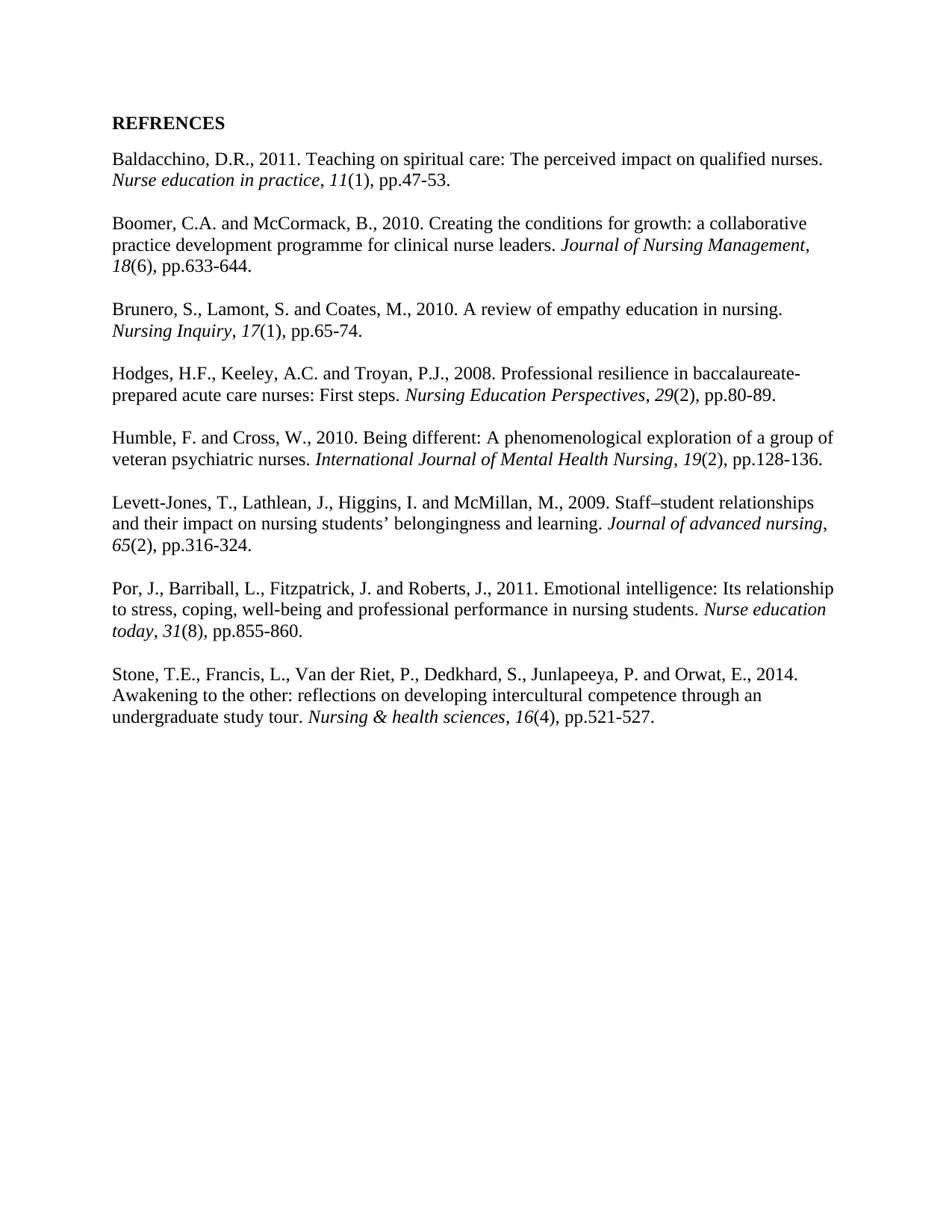
REFRENCES
Baldacchino, D.R., 2011. Teaching on spiritual care: The perceived impact on qualified nurses.
Nurse education in practice, 11(1), pp.47-53.
Boomer, C.A. and McCormack, B., 2010. Creating the conditions for growth: a collaborative
practice development programme for clinical nurse leaders. Journal of Nursing Management,
18(6), pp.633-644.
Brunero, S., Lamont, S. and Coates, M., 2010. A review of empathy education in nursing.
Nursing Inquiry, 17(1), pp.65-74.
Hodges, H.F., Keeley, A.C. and Troyan, P.J., 2008. Professional resilience in baccalaureate-
prepared acute care nurses: First steps. Nursing Education Perspectives, 29(2), pp.80-89.
Humble, F. and Cross, W., 2010. Being different: A phenomenological exploration of a group of
veteran psychiatric nurses. International Journal of Mental Health Nursing, 19(2), pp.128-136.
Levett‐Jones, T., Lathlean, J., Higgins, I. and McMillan, M., 2009. Staff–student relationships
and their impact on nursing students’ belongingness and learning. Journal of advanced nursing,
65(2), pp.316-324.
Por, J., Barriball, L., Fitzpatrick, J. and Roberts, J., 2011. Emotional intelligence: Its relationship
to stress, coping, well-being and professional performance in nursing students. Nurse education
today, 31(8), pp.855-860.
Stone, T.E., Francis, L., Van der Riet, P., Dedkhard, S., Junlapeeya, P. and Orwat, E., 2014.
Awakening to the other: reflections on developing intercultural competence through an
undergraduate study tour. Nursing & health sciences, 16(4), pp.521-527.
Baldacchino, D.R., 2011. Teaching on spiritual care: The perceived impact on qualified nurses.
Nurse education in practice, 11(1), pp.47-53.
Boomer, C.A. and McCormack, B., 2010. Creating the conditions for growth: a collaborative
practice development programme for clinical nurse leaders. Journal of Nursing Management,
18(6), pp.633-644.
Brunero, S., Lamont, S. and Coates, M., 2010. A review of empathy education in nursing.
Nursing Inquiry, 17(1), pp.65-74.
Hodges, H.F., Keeley, A.C. and Troyan, P.J., 2008. Professional resilience in baccalaureate-
prepared acute care nurses: First steps. Nursing Education Perspectives, 29(2), pp.80-89.
Humble, F. and Cross, W., 2010. Being different: A phenomenological exploration of a group of
veteran psychiatric nurses. International Journal of Mental Health Nursing, 19(2), pp.128-136.
Levett‐Jones, T., Lathlean, J., Higgins, I. and McMillan, M., 2009. Staff–student relationships
and their impact on nursing students’ belongingness and learning. Journal of advanced nursing,
65(2), pp.316-324.
Por, J., Barriball, L., Fitzpatrick, J. and Roberts, J., 2011. Emotional intelligence: Its relationship
to stress, coping, well-being and professional performance in nursing students. Nurse education
today, 31(8), pp.855-860.
Stone, T.E., Francis, L., Van der Riet, P., Dedkhard, S., Junlapeeya, P. and Orwat, E., 2014.
Awakening to the other: reflections on developing intercultural competence through an
undergraduate study tour. Nursing & health sciences, 16(4), pp.521-527.
1 out of 8
Your All-in-One AI-Powered Toolkit for Academic Success.
+13062052269
info@desklib.com
Available 24*7 on WhatsApp / Email
![[object Object]](/_next/static/media/star-bottom.7253800d.svg)
Unlock your academic potential
© 2024 | Zucol Services PVT LTD | All rights reserved.




